Introduction
Explanation of Nigeria’s COVID-19 situation
Nigeria, like many other countries, has been severely impacted by the COVID-19 pandemic.
The number of cases continues to rise, putting immense strain on the healthcare system.
The role of healthcare professionals in the pandemic
Healthcare professionals play a crucial role in addressing the challenges posed by the pandemic.
They are at the forefront, providing essential services and support to the affected population.
Importance of pharmacists in Nigeria’s response to COVID-19
Pharmacists have emerged as key players in Nigeria’s response to COVID-19. They are actively involved in various aspects, from dispensing medications to conducting public health campaigns.
Pharmacists have been instrumental in ensuring the availability and distribution of critical medications needed to treat COVID-19 patients.
They have also been responsible for monitoring medication usage and providing guidance to healthcare providers on proper usage and potential drug interactions.
Additionally, pharmacists have been actively involved in public health initiatives, providing education and guidance on preventive measures such as hand hygiene and mask usage.
Their expertise in pharmaceutical care has been invaluable in helping to minimize the impact of the virus and ensure the effective management of patients.
In summary, pharmacists in Nigeria have made significant contributions to the country’s COVID-19 response.
Their role in ensuring access to medications, providing guidance, and promoting public health measures has been crucial in mitigating the effects of the pandemic.
As the fight against COVID-19 continues, the importance of pharmacists cannot be overstated.
Background on pharmacists in Nigeria
Overview of the pharmacy profession in Nigeria
Pharmacy is a crucial field in Nigeria’s healthcare system that plays a critical role in the provision of quality healthcare services to its citizens.
Pharmacists, as healthcare professionals, contribute significantly to Nigeria’s COVID-19 response.
Pharmacists in Nigeria are responsible for the preparation, dispensing, and proper use of medicines.
They ensure that medications are safe and effective for patients by providing accurate dosage instructions and monitoring adverse effects.
These professionals play a pivotal role in preventing medication errors, thus enhancing patient safety.
Duties and responsibilities of pharmacists in the healthcare system
Pharmacists in Nigeria have a wide range of duties and responsibilities within the healthcare system.
They collaborate with other healthcare professionals to optimize patient outcomes and ensure rational medicine use.
One of their primary roles is to review medication orders and prescriptions to detect any potential drug interactions or contraindications.
Additionally, pharmacists provide medication counseling to patients, ensuring they understand the proper use, storage, and potential side effects of their medications.
They play a pivotal role in promoting adherence to medication regimens, thus improving treatment outcomes.
During the COVID-19 pandemic, pharmacists have been actively involved in providing accurate and evidence-based information to combat misinformation and myths surrounding the virus.
They educate the public on preventive measures, such as the use of face masks and hand hygiene, thereby contributing to the overall efforts in controlling the spread of the virus.
Education and training required to become a pharmacist in Nigeria
The path to becoming a pharmacist in Nigeria is rigorous and requires several years of education and training.
To enter a pharmacy program, students must have a strong foundation in science subjects, including biology, chemistry, physics, and mathematics.
After completing secondary education, aspiring pharmacists undergo a five-year Bachelor of Pharmacy (B.Pharm) program in a recognized university.
The program incorporates theoretical and practical training, covering various aspects of pharmaceutical sciences and patient care.
Upon graduation, aspiring pharmacists are required to complete a one-year internship program under the supervision of licensed pharmacists.
This internship period further enhances their clinical skills and provides them with hands-on experience in different pharmacy settings.
After the internship, pharmacists are eligible to register with the Pharmacists Council of Nigeria (PCN) and obtain a license to practice.
The PCN ensures that pharmacists meet the required professional standards and are competent to deliver quality pharmaceutical care.
In Short, pharmacists in Nigeria play a vital role in the healthcare system and have made significant contributions to the country’s COVID-19 response.
Their responsibilities encompass various aspects of medication management, patient education, and public health promotion.
To become a pharmacist in Nigeria, individuals must undergo extensive education and training and meet the professional standards set by regulatory bodies.
Read: Earnings and Salaries: How Much Does a Pharmacist Make in Nigeria?
Pharmacists’ involvement in Nigeria’s COVID-19 response
Provision of essential medications and drugs
Amid the COVID-19 pandemic, pharmacists have played a crucial role in ensuring the availability and dispensing of essential medications and drugs to patients.
One of their primary tasks has been to maintain robust supply chains, guaranteeing that critical medications are readily accessible to those in need.
As frontline healthcare providers, pharmacists have been at the forefront, tirelessly working to dispense medications to COVID-19 patients, thus supporting their recovery and easing the burden on the healthcare system.
Contributing to public awareness and education
Pharmacists have also been instrumental in disseminating accurate information on vaccines, treatments, and preventive measures related to COVID-19.
They have actively engaged with communities, providing valuable education to raise awareness about the virus and its management.
Their efforts have been vital in promoting preventive measures such as wearing masks, practicing proper hygiene, and following social distancing guidelines.
Additionally, pharmacists have taken up the challenge of addressing and dispelling misinformation and myths surrounding COVID-19, ensuring that people make informed decisions about their health.
Collaboration with healthcare teams
Recognizing the importance of collaborative efforts in combating the pandemic, pharmacists have seamlessly integrated into healthcare teams.
They have worked alongside doctors and nurses, providing valuable insights and support in the treatment of COVID-19 patients.
Their expertise in medications and therapies has proved invaluable, with pharmacists actively consulting with other healthcare professionals to optimize patient care.
Furthermore, they have been diligently monitoring patients’ progress, making necessary adjustments to treatments when needed, thereby contributing to better patient outcomes.
Therefore, the contribution of pharmacists in Nigeria’s COVID-19 response has been multifaceted and invaluable.
From ensuring the availability and dispensing of crucial medications to actively promoting public awareness and education, pharmacists have been an indispensable part of the healthcare system’s efforts in combating the pandemic.
Their collaboration with healthcare teams has further strengthened patient care and overall response measures.
As the battle against COVID-19 continues, the role of pharmacists remains pivotal in safeguarding public health and wellbeing.
Read: Challenges and Rewards of Phlebotomy in Nigeria

Challenges faced by pharmacists during the COVID-19 response
Increased workload and stress levels
Pharmacists in Nigeria have been facing an unprecedented increase in workload due to the COVID-19 pandemic.
The demand for medications and healthcare services has surged, putting immense pressure on pharmacists.
With limited healthcare infrastructure, pharmacists have found themselves working extra hours, often without breaks, to meet the growing needs of the population.
The constantly changing nature of the pandemic, along with the need to keep up with new research and data, has added to their stress levels.
Pharmacists are responsible for staying updated with the latest information and guidelines to provide accurate information to patients.
Furthermore, they have been at the forefront of dispensing medications and counseling patients, which has contributed to their already demanding workload.
Shortage of personal protective equipment
Pharmacists have had to face a shortage of Personal Protective Equipment (PPE) during the COVID-19 response.
PPE includes items such as masks, gloves, and gowns that protect healthcare workers from contracting and spreading the virus.
Due to the high demand for PPE globally, supply chains have been disrupted, leading to a scarcity of these essential items.
This has put the health and safety of pharmacists at risk, as they interact with a wide range of patients, including those suspected or confirmed to have COVID-19.
Pharmacists have had to adapt by reusing PPE, which compromises its effectiveness and increases the likelihood of exposure to the virus.
This shortage has further burdened pharmacists, who are already dealing with the increased workload and stress.
Adapting to new protocols and safety measures
COVID-19 has brought about significant changes in healthcare protocols and safety measures. Pharmacists have had to quickly adapt to these new guidelines to ensure the safety of both themselves and their patients.
They have been required to implement social distancing measures in pharmacies, such as limiting the number of patients inside the premises and marking out designated waiting areas.
This has posed logistical challenges, as managing crowd control while providing efficient services can be difficult.
Additionally, pharmacists have had to establish new sanitation protocols, involving frequent and thorough cleaning of surfaces and equipment.
These measures are time-consuming and have added to the already increased workload.
Dealing with medication shortages and supply chain disruptions
Pharmacists have faced challenges in sourcing and maintaining an adequate supply of medications during the COVID-19 response.
The global pandemic has disrupted supply chains, leading to shortages of essential drugs.
This has put pharmacists in a difficult position, as they are responsible for ensuring the availability of medications for patients.
They have had to explore alternative suppliers and coordinate with healthcare authorities to manage medication shortages effectively.
Moreover, panic buying and stockpiling by the public have exacerbated the problem. Pharmacists have had to enforce prescription-only policies and ration medications to ensure equitable distribution.
These disruptions in the supply chain have increased the burden on pharmacists, who have had to invest extra time and effort in sourcing medications and ensuring their safe storage and distribution.
Read: Top Institutions to Study Phlebotomy in Nigeria
The Impact and Achievements of Pharmacists in Nigeria’s COVID-19 Response
Role in Vaccine Distribution and Administration
Pharmacists in Nigeria have played a crucial role in the distribution and administration of COVID-19 vaccines.
They have been tasked with ensuring that vaccines reach the target population efficiently and effectively.
Pharmacists have been responsible for proper storage and handling of the vaccines to maintain their efficacy.
Through their expertise in pharmaceuticals, they have contributed to the successful immunization of millions of Nigerians.
Contributing to the Reduction in COVID-19-related Hospitalizations and Deaths
Pharmacists have played a vital role in reducing hospitalizations and deaths related to COVID-19 in Nigeria.
They have been actively involved in providing patients with appropriate medication and monitoring their progress.
Pharmacists have worked closely with healthcare professionals to develop treatment protocols and optimize patient care.
Their contributions in medication management have helped in improving outcomes and minimizing the burden on healthcare facilities.
Read: Occupational Therapy Schools: Where to Study in Nigeria
Importance of Pharmacy Services in Remote and Underserved Areas
Pharmacy services in remote and underserved areas have been critical in Nigeria’s COVID-19 response.
Pharmacists have played a significant role in providing essential medications and healthcare advice to these communities.
Publish Your Professional Profile, Business or Brand
Showcase your expertise, gain trust, and boost visibility instantly on Professions.ng.
Publish NowThey have bridged the gap in access to healthcare, ensuring that even the most marginalized populations are not left behind.
Through telepharmacy and mobile health units, pharmacists have reached remote areas with limited healthcare infrastructure.
Recognition of Pharmacists’ Efforts by Government and Healthcare Organizations
The efforts of pharmacists in Nigeria’s COVID-19 response have been widely recognized by the government and healthcare organizations.
They have been lauded for their commitment, dedication, and professionalism in providing healthcare services during the pandemic.
Pharmacists have received awards and acknowledgments for their contributions to public health and patient care.
Their role has been acknowledged as indispensable in the fight against COVID-19 and in strengthening the healthcare system.
Read: Future Prospects: The Evolution of Pharmacy in Nigeria
Conclusion
Pharmacists have played a crucial and indispensable role in Nigeria’s COVID-19 response.
Their expertise in medication management, patient counseling, and public health education has been instrumental in combating the pandemic.
Throughout this blog post, we have highlighted the various ways pharmacists have contributed to the national response.
They have served as frontline healthcare workers, ensuring the availability and safe distribution of medications to patients in need.
Moreover, they have played an important role in educating the public about preventive measures and dispelling myths and misinformation regarding the virus.
It is essential to appreciate and support the pharmacy profession for their dedication and commitment during these challenging times.
As healthcare heroes, pharmacists have put their lives on the line to ensure the continuity of essential healthcare services. Their contributions should not be overlooked or undervalued.
Looking ahead, pharmacists will continue to play a vital role in healthcare crisis management.
The lessons learned from the COVID-19 pandemic will inform and enhance their capabilities in future emergencies.
Their expertise in medication management, immunization, and public health education will be invaluable in mitigating the impact of any future healthcare crisis.
It is crucial to invest in their training, resources, and recognition to optimize their potential in crisis management.
In the end, pharmacists have proven themselves as essential healthcare professionals in Nigeria’s COVID-19 response.
Their knowledge, skills, and dedication have been crucial in protecting public health. It is time to acknowledge and support the pharmacy profession for their invaluable contributions.




